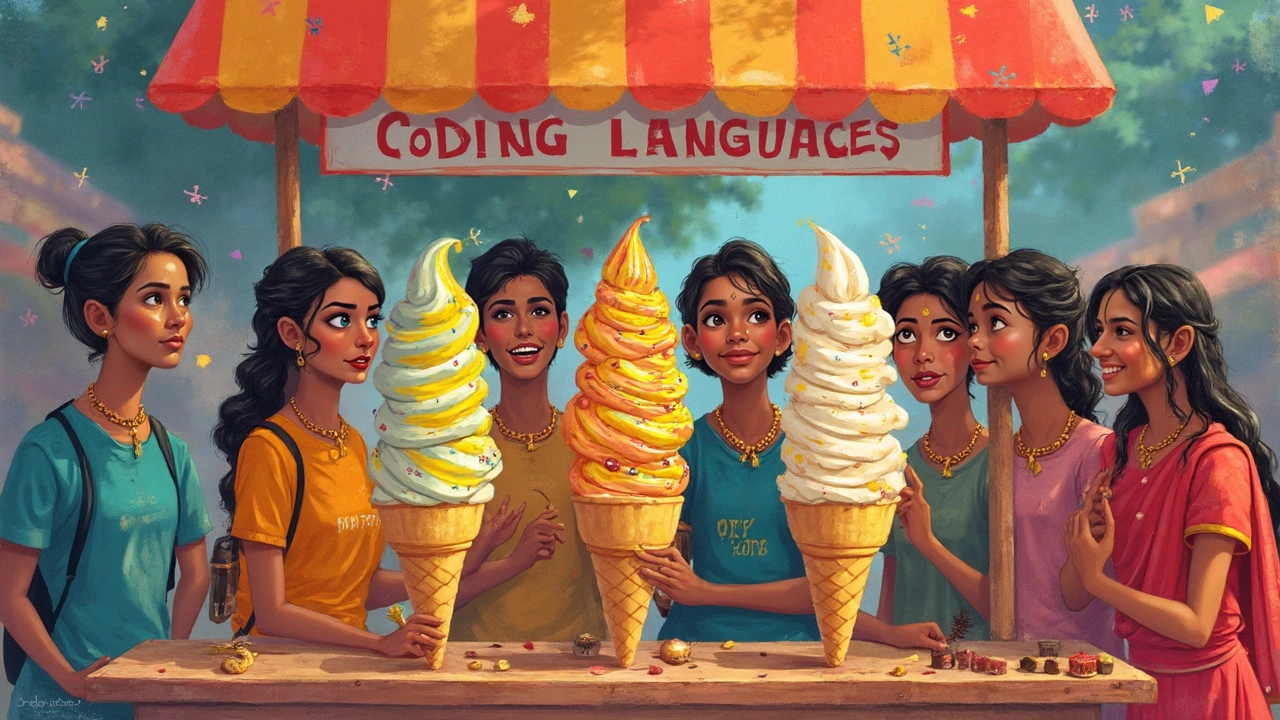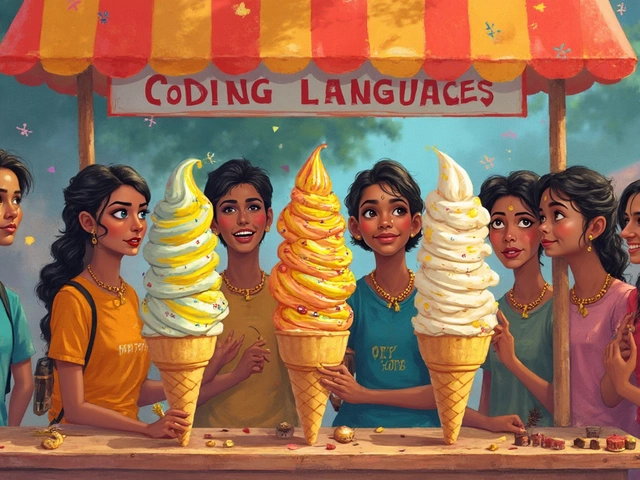Picking your first coding language is like trying to decide what movie to watch when all your friends have different favorites. Do you go for the trendy blockbuster everyone’s talking about or the classic that stood the test of time? Luckily, this choice doesn't have to be overwhelming if you know what you're looking for.
Let’s talk about Python. It’s the language everyone seems to suggest, and for good reason. It’s kind of like learning to drive in an empty parking lot before heading out onto the freeway. Python is beginner-friendly, which means it’s forgiving and easy to grasp – perfect if you're dipping your toes into coding for the first time. Plus, it's super versatile, so whether you're interested in web development, data analysis, or just automating your daily tasks, Python might be your new best pal.
- The Importance of Choosing the Right Language
- Breaking Down the Popular Options
- Matching Your Goals with the Right Language
- Tips to Kickstart Your Coding Journey
The Importance of Choosing the Right Language
Choosing the right coding language is kind of like picking the right tool for a job. You wouldn’t use a hammer to tighten a screw, right? The same goes for programming languages—a mismatch can lead to frustration and a lot of wasted time.
One key factor to consider is what you actually want to do with your new coding skills. If you're interested in web development, JavaScript is basically your go-to. It runs in all modern web browsers and is essential for creating interactive websites. On the other hand, if you’re aiming for something like data science, Python should probably top your list because it’s famous for its powerful data analysis libraries.
Let's not forget the importance of community support. A popular language like Python or JavaScript means that there are tons of resources available, whether it’s tutorials, forums, or coding classes. This is huge when you hit a roadblock and need some guidance. Plus, it’s easier to find like-minded learners and experts who can help you out.
A language’s popularity can also impact your job prospects. According to a 2025 job trends report, Python and JavaScript skills are among the highest sought-after in tech job postings across major cities worldwide. So if getting a job is a big part of your goal, you might want to consider these heavyweights.
Skill relevance is another factor. Technology evolves, and so do coding needs. A language that’s all the rage today might be obsolete tomorrow. However, languages like Python and JavaScript are continually updated by their communities to keep up with tech trends, so they’re likely to remain relevant for the foreseeable future.
In a nutshell, thinking about what you want to do with your skills, how much support you’ll have, and your career goals will guide you to pick the best coding language to start with. Make sure it aligns with what you aim to achieve, and you'll be charting the right path for your coding journey.
Breaking Down the Popular Options
Let's be real, choosing the right coding languages to learn first can be like finding the perfect slice of pizza in a city full of great pizzerias. But don’t worry, we're here to break it down and make it less of a head-scratcher.
First up, we've got Python. It's the sweetheart of the tech world. People love Python because it's super easy to read and write. Think of it as the 'English' of programming languages. It's great for beginners because its syntax is simple and intuitive. Plus, Python is used in so many areas like web development, data science, and even artificial intelligence!
Then, there's JavaScript, the language of the web. If you've ever thought about building cool websites or web apps, JavaScript is your ticket in. It's the technology behind dynamic web pages and interfaces we use every day.
Java is another solid option. It's like the reliable workhorse of programming languages—unfussy and dependable. Java’s 'write once, run anywhere' capability means once you've written your code, it can run on any device that supports Java. This language is widely used in enterprise environments and Android app development. If you're aiming for a career in big companies or mobile app development, learning Java might be a smart move.
Ruby, the language behind Ruby on Rails, is loved for its simplicity and productivity. It’s like building something with LEGO sets—pieces easily fit together and you can quickly see results. Perfect if you want to whip up web applications fast.
| Language | Use Cases | Learning Difficulty |
|---|---|---|
| Python | Web development, Data science, AI | Easy |
| JavaScript | Web Development, Mobile apps | Moderate |
| Java | Enterprise, Mobile apps | Moderate |
| Ruby | Web Development | Easy |
Remember, there's no one-size-fits-all when it comes to learning programming for beginners. It's more about what fits your interests and career goals. Each language has its own flavor and strength, and the one you choose depends on the path you want to take in the coding world.

Matching Your Goals with the Right Language
When you're figuring out which coding language to tackle first, think of it like choosing the right shoes for the occasion. You wouldn’t wear hiking boots to a beach, right? Similarly, your coding goals should guide your choice.
Are you looking to get into web development? If so, give JavaScript a try. It's practically a must-have in the web world since it handles everything from making websites responsive to adding interactive elements. Plus, JavaScript is used in frameworks like React and Angular, which are popular with businesses right now.
Maybe you're curious about data analysis or machine learning. In that case, Python is your go-to. It's used a lot in those fields because of its readable syntax and a wealth of libraries like NumPy and TensorFlow. Python makes it easier to handle those complex calculations and data sets you’ll deal with.
Want to dive into mobile app development? Check out Swift for iOS and Java for Android. Swift was developed by Apple, so if you're aiming for the iPhone/iPad app market, it's your best bet. On the other hand, Java’s the old reliable option for Android, with a big community to back you up.
If you’re drawn to gaming, C# might be your jam. It's widely used with the Unity engine, a favorite among indie developers and big studios alike. It opens doors not just to game design but also to virtual reality experiences.
Keep in mind, learning one language often makes picking up others easier later on. Your first language is just the start, and whatever you choose, it’s an investment in understanding the logic that underpins code.
Tips to Kickstart Your Coding Journey
So, you've decided to dive into the world of coding, but where do you even start? Don’t sweat it; I’ve got some cozy steps to make sure you hit the ground running.
First, set some clear goals for yourself. Ask yourself, "Why am I learning to code?" Is it to build websites, create an app, or maybe score a tech job? Your answer will guide the path you take and which coding language might suit you best.
Next, pick the right resources. We live in a magical time where you can learn almost anything online, often for free. Check out platforms like Codecademy, freeCodeCamp, or Coursera. They offer interactive lessons for beginners that can make learning fun and engaging rather than a chore.
Don't forget to practice, practice, practice. Think of coding as learning a new instrument—you can't master it by just reading sheet music. Tackle small projects to apply what you've learned. Build a simple website, automate a task, or try tweaking a game. The more you code, the more it sticks.
- Start by committing to coding at least 30 minutes a day. Consistency beats binge-learning.
- Join a community. Hop onto forums like Stack Overflow or Reddit’s r/learnprogramming. Being part of a community can provide support, resources, and even friends.
- Don’t be afraid to make mistakes. They’re not just okay; they’re your best teachers.
Lastly, keep that curiosity alive. Technology changes fast, and the most successful developers are lifelong learners. Subscribe to tech blogs or follow coding influencers on Twitter to stay in the loop. Remember, every expert was once a newbie, just like you.



